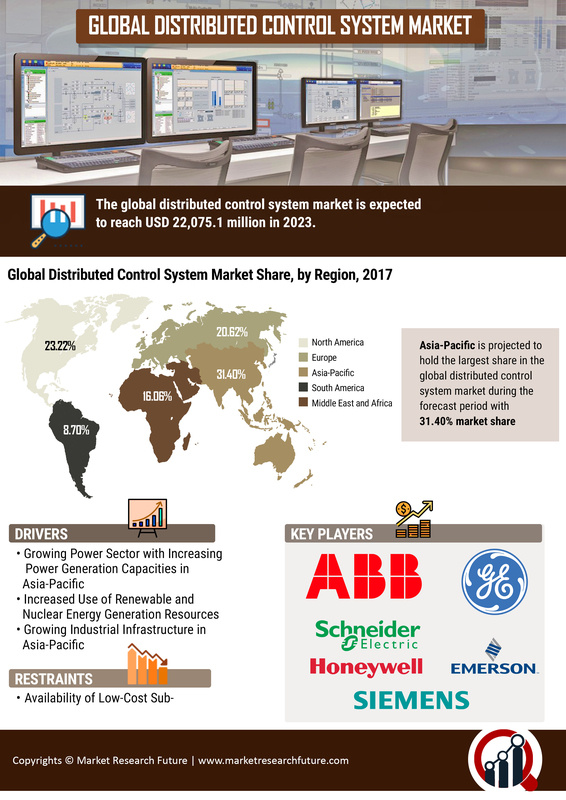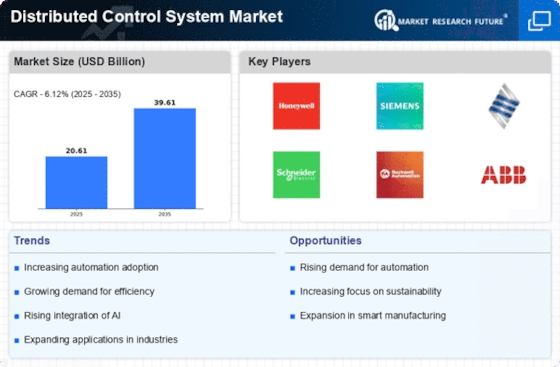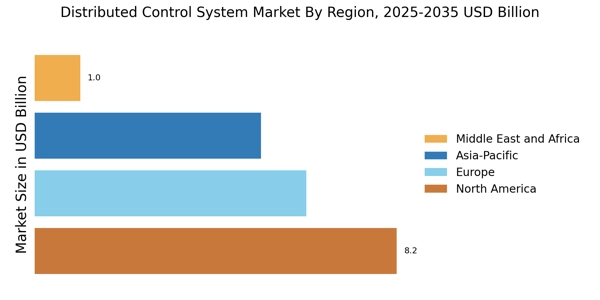Rising Demand for Automation
The increasing demand for automation across various industries is a primary driver for the Distributed Control System Market. Industries such as oil and gas, chemicals, and power generation are increasingly adopting automated solutions to enhance operational efficiency and reduce human error. According to recent data, the automation market is projected to grow at a compound annual growth rate of approximately 9% over the next five years. This trend indicates a robust shift towards automated systems, which are integral to the functionality of distributed control systems. As organizations seek to optimize their processes, the Distributed Control System Market is likely to experience substantial growth, driven by the need for advanced control solutions that can manage complex operations seamlessly.
Growing Focus on Energy Efficiency
The growing focus on energy efficiency is emerging as a significant driver for the Distributed Control System Market. As organizations seek to reduce operational costs and minimize their environmental impact, the demand for energy-efficient control systems is on the rise. The implementation of distributed control systems allows for better energy management and optimization of resources, which is crucial in sectors such as manufacturing and utilities. Market analysis suggests that the energy management system market is expected to grow at a rate of around 10% annually, indicating a strong trend towards energy-efficient solutions. This shift is likely to enhance the relevance of the Distributed Control System Market as companies prioritize sustainability and cost-effectiveness.
Regulatory Compliance and Safety Standards
The stringent regulatory compliance and safety standards imposed on various industries are driving the growth of the Distributed Control System Market. Industries such as pharmaceuticals, food and beverage, and energy are required to adhere to rigorous safety protocols, which necessitate the implementation of reliable control systems. The demand for systems that can ensure compliance with these regulations is expected to propel market growth. Recent statistics indicate that the safety and compliance market is projected to grow by approximately 7% over the next few years. Consequently, the Distributed Control System Market is likely to benefit from the increasing need for systems that not only enhance operational efficiency but also ensure adherence to safety regulations.
Technological Advancements in Control Systems
Technological advancements play a crucial role in shaping the Distributed Control System Market. Innovations such as enhanced data analytics, machine learning, and IoT integration are transforming traditional control systems into more sophisticated platforms. These advancements enable real-time monitoring and predictive maintenance, which are essential for minimizing downtime and improving productivity. The market for advanced control systems is expected to witness a growth rate of around 8% annually, reflecting the increasing reliance on technology in industrial applications. As companies strive to remain competitive, the adoption of cutting-edge technologies within the Distributed Control System Market is anticipated to accelerate, fostering a more efficient operational landscape.
Expansion of Industrial Internet of Things (IIoT)
The expansion of the Industrial Internet of Things (IIoT) is significantly influencing the Distributed Control System Market. The integration of IIoT technologies into control systems enables enhanced connectivity, data sharing, and real-time analytics, which are essential for modern industrial operations. As industries increasingly adopt IIoT solutions, the demand for distributed control systems that can seamlessly integrate with these technologies is expected to rise. Current projections indicate that the IIoT market will grow at a compound annual growth rate of approximately 12% over the next several years. This trend suggests that the Distributed Control System Market will likely experience substantial growth as organizations seek to leverage IIoT capabilities to improve operational efficiency and decision-making.


















